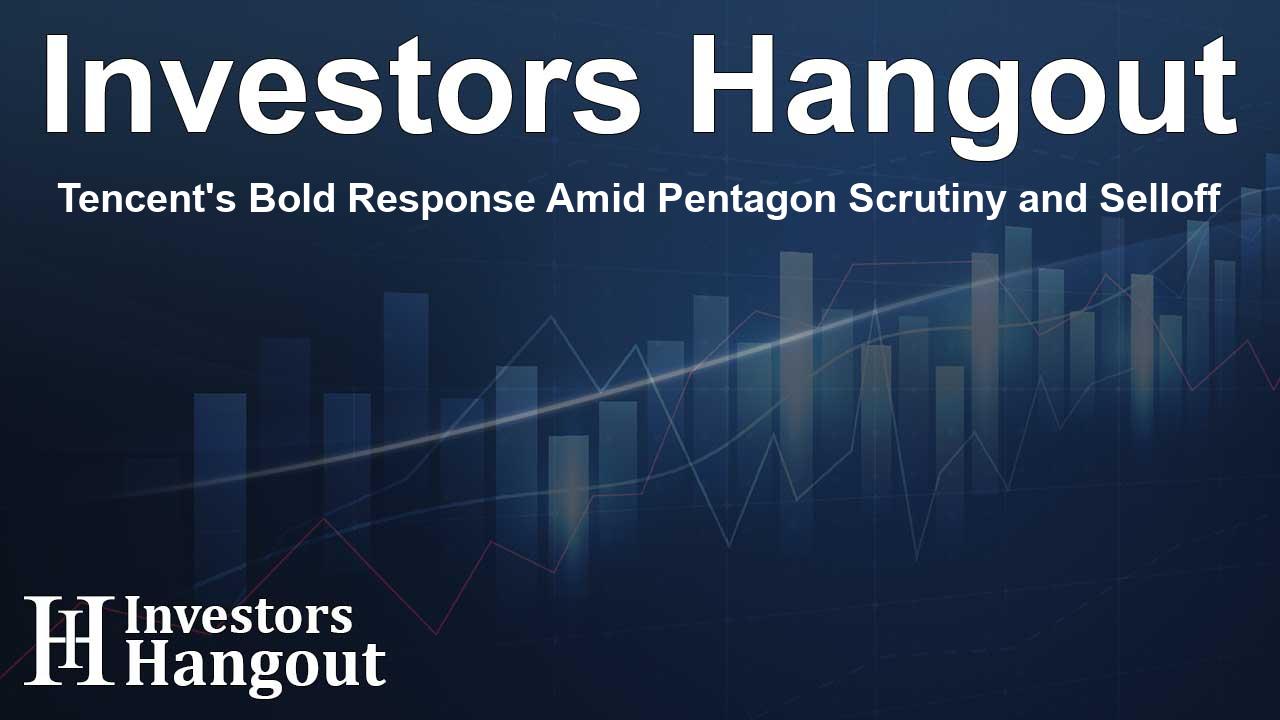Tencent's Bold Response Amid Pentagon Scrutiny and Selloff

Tencent's Strategic Share Buyback Initiative
Tencent Holdings, a major player in the global tech landscape, has made headlines recently due to its impressive moves to stabilize its stock price. Following its addition to a sensitive Pentagon list, Tencent executed its largest single-day share buyback, signifying its commitment to maintaining market confidence.
Details of the Buyback Program
In a remarkable turn of events, Tencent has invested close to $193.3 million to repurchase approximately 4.05 million of its own shares. This significant buyback effort took place shortly after the company purchased an additional 3.93 million shares just a day prior. These moves are a part of Tencent’s ongoing initiative to safeguard its stock amidst market volatility.
The Driving Force Behind Recent Market Movements
The catalyst for this heightened buyback activity was a substantial decline in Tencent’s stock value, which experienced its second-largest drop in the previous year. This decline was triggered by the US Department of Defense’s classification of Tencent as a company with military affiliations. Analysts attributed this to concerns over the integration between commercial corporations and military technologies in China.
Tencent's Response to the Pentagon Listing
Tencent strongly disputed the Pentagon’s classification, labeling it a “mistake” and communicating intentions to seek removal from the list. In the face of continued market pressure, Tencent’s shares fell an additional 2.7% during a trading session in Hong Kong.
Market Reactions and Analyst Insights
Market analysts from Barclays noted that being included in the US Department of Defense’s Section 1260H list does not impose direct legal obligations for US investors concerning Tencent’s stock. This clarity helped ease some investor anxiety following the announcement.
Understanding the Pentagon's Lists
The presence of two similarly titled lists generated some market confusion. The Department of Defense’s 1260H list contrasts with the Treasury’s NS-CMIC list, which does impose limitations. While the latter requires US investors to divest within a period of 12 months, being listed on the 1260H list does not carry immediate legal consequences.
Historical Context and Future Expectations
Nonetheless, analysts have raised concerns over the implications of remaining on the Department of Defense’s list for an extended period. They explained that there is a historical trend where companies initially listed on the DoD's 1260H eventually find themselves on the Treasury's NS-CMIC list. Importantly, a notable exception is Xiaomi, which took legal action and was successfully removed from such listings.
The Path Forward for Tencent Shares
As Tencent navigates these challenges, analysts are predicting pressure on its shares in the immediate future. Despite ongoing market uncertainties, Tencent is focused on its growth strategy, having increased its share repurchase budget significantly to approximately $14.4 billion for the upcoming year.
Conclusion
The proactive approach taken by Tencent amidst recent market challenges reflects its resolve to uphold investor confidence. As the company ramps up efforts, all eyes will be on how effectively it can aid its stock through these turbulent times and shape its long-term trajectory post-repurchase initiatives.
Frequently Asked Questions
What is driving Tencent's share buyback program?
Tencent's buyback program is primarily a response to market instability after its addition to the Pentagon's 1260H list, aimed at stabilizing its stock price.
How much did Tencent spend on its recent buybacks?
Tencent spent approximately $193.3 million on the recent buybacks, repurchasing a total of 4.05 million shares over two days.
What does being on the Pentagon's 1260H list mean for Tencent?
The listing indicates potential military ties but does not impose direct legal restrictions on US investors trading Tencent shares.
What are the potential long-term implications for Tencent's shares?
Remaining on the 1260H list could lead to increased scrutiny and may eventually affect Tencent's position on the US Treasury's NS-CMIC list if trends from the past hold true.
How has the market reacted to Tencent's buyback efforts?
The market showed some positive reaction to Tencent's buyback moves, although shares fell further during trading, indicating ongoing investor caution.
About The Author
Contact Dylan Bailey privately here. Or send an email with ATTN: Dylan Bailey as the subject to contact@investorshangout.com.
About Investors Hangout
Investors Hangout is a leading online stock forum for financial discussion and learning, offering a wide range of free tools and resources. It draws in traders of all levels, who exchange market knowledge, investigate trading tactics, and keep an eye on industry developments in real time. Featuring financial articles, stock message boards, quotes, charts, company profiles, and live news updates. Through cooperative learning and a wealth of informational resources, it helps users from novices creating their first portfolios to experts honing their techniques. Join Investors Hangout today: https://investorshangout.com/
The content of this article is based on factual, publicly available information and does not represent legal, financial, or investment advice. Investors Hangout does not offer financial advice, and the author is not a licensed financial advisor. Consult a qualified advisor before making any financial or investment decisions based on this article. This article should not be considered advice to purchase, sell, or hold any securities or other investments. If any of the material provided here is inaccurate, please contact us for corrections.
